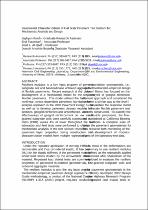 ResearchSpace
ResearchSpace
Geomaterial characterizations of full scale pavement test sections for mechanistic analysis and design
JavaScript is disabled for your browser. Some features of this site may not work without it.
- ResearchSpace
- →
- Research Publications/Outputs
- →
- Conference Publications
- →
- View Item
| dc.contributor.author |
Kwon, J

|
|
| dc.contributor.author |
Tutumluer, E

|
|
| dc.contributor.author |
Al-Qadi, IL

|
|
| dc.contributor.author |
Anochie-Boateng, Joseph

|
|
| dc.date.accessioned | 2009-01-30T12:43:48Z | |
| dc.date.available | 2009-01-30T12:43:48Z | |
| dc.date.issued | 2007-02 | |
| dc.identifier.citation | Kwon, J, Tutumluer, E, Al-Qadi, IL and Anochie-Boateng, J. 2007. Geomaterial characterizations of full scale pavement test sections for mechanistic analysis and design. Geo-Denver 2007: New Peaks in Geotechnics; Congress, Denver, USA, 18-21 February 2007, pp 10 | en |
| dc.identifier.isbn | 0784408971 | |
| dc.identifier.uri | http://cedb.asce.org | |
| dc.identifier.uri | http://hdl.handle.net/10204/2958 | |
| dc.description | Published by the American Society of Civil Engineers (2007) | en |
| dc.description.abstract | Resilient modulus is a key input property of pavement foundation geomaterials, i.e., subgrade soil and base/subbase unbound aggregate, for the mechanistic-empirical design of flexible pavements. Recent research at the University of Illinois has focused on the development of a mechanistic model for the response analysis of geogrid reinforced flexible pavements. This model utilized the finite element approach and considered the nonlinear, stress dependent pavement foundation behavior in a similar way to the level I analysis approach in the 2002 Pavement Design Guide. To validate the response model as well as to develop pavement distress models, nine full-scale flexible pavement test sections, geogrid reinforced and unreinforced, were recently constructed. To quantify the effectiveness of geogrid reinforcement on low volume flexible pavements, the fine-grained subgrade soils were carefully constructed and maintained at California Bearing Ratio (CBR) values 4% or lower throughout the test sections. A complete suite of laboratory and field tests were performed to characterize the pavement geomaterials for mechanistic analysis of the test section response. This required both monitoring of the pavement layer properties during construction and also development of modulus characterization models from multiple regression analyses of the laboratory test data | en |
| dc.language.iso | en | en |
| dc.publisher | American Society of Civil Engineers | en |
| dc.subject | Geomaterials | en |
| dc.subject | Full scale pavement | en |
| dc.subject | Mechanistic design | en |
| dc.title | Geomaterial characterizations of full scale pavement test sections for mechanistic analysis and design | en |
| dc.type | Conference Presentation | en |
| dc.identifier.apacitation | Kwon, J., Tutumluer, E., Al-Qadi, I., & Anochie-Boateng, J. (2007). Geomaterial characterizations of full scale pavement test sections for mechanistic analysis and design. American Society of Civil Engineers. http://hdl.handle.net/10204/2958 | en_ZA |
| dc.identifier.chicagocitation | Kwon, J, E Tutumluer, IL Al-Qadi, and Joseph Anochie-Boateng. "Geomaterial characterizations of full scale pavement test sections for mechanistic analysis and design." (2007): http://hdl.handle.net/10204/2958 | en_ZA |
| dc.identifier.vancouvercitation | Kwon J, Tutumluer E, Al-Qadi I, Anochie-Boateng J, Geomaterial characterizations of full scale pavement test sections for mechanistic analysis and design; American Society of Civil Engineers; 2007. http://hdl.handle.net/10204/2958 . | en_ZA |
| dc.identifier.ris | TY - Conference Presentation AU - Kwon, J AU - Tutumluer, E AU - Al-Qadi, IL AU - Anochie-Boateng, Joseph AB - Resilient modulus is a key input property of pavement foundation geomaterials, i.e., subgrade soil and base/subbase unbound aggregate, for the mechanistic-empirical design of flexible pavements. Recent research at the University of Illinois has focused on the development of a mechanistic model for the response analysis of geogrid reinforced flexible pavements. This model utilized the finite element approach and considered the nonlinear, stress dependent pavement foundation behavior in a similar way to the level I analysis approach in the 2002 Pavement Design Guide. To validate the response model as well as to develop pavement distress models, nine full-scale flexible pavement test sections, geogrid reinforced and unreinforced, were recently constructed. To quantify the effectiveness of geogrid reinforcement on low volume flexible pavements, the fine-grained subgrade soils were carefully constructed and maintained at California Bearing Ratio (CBR) values 4% or lower throughout the test sections. A complete suite of laboratory and field tests were performed to characterize the pavement geomaterials for mechanistic analysis of the test section response. This required both monitoring of the pavement layer properties during construction and also development of modulus characterization models from multiple regression analyses of the laboratory test data DA - 2007-02 DB - ResearchSpace DP - CSIR KW - Geomaterials KW - Full scale pavement KW - Mechanistic design LK - https://researchspace.csir.co.za PY - 2007 SM - 0784408971 T1 - Geomaterial characterizations of full scale pavement test sections for mechanistic analysis and design TI - Geomaterial characterizations of full scale pavement test sections for mechanistic analysis and design UR - http://hdl.handle.net/10204/2958 ER - | en_ZA |





